Obrador Targeted in a Plot
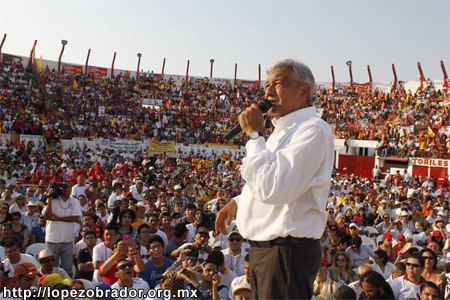
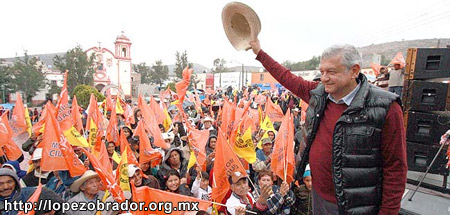
The dialog was:
• The man did not mean to cause me any harm, even though he was armed. I have no enemies, nor am going to have any. I do have political opponents whom I sincerely respect, and I also know that they respect me.
• You insist that no reinforcement of your security service is needed, but would it make sense to die under such circumstances in the name of democracy?
• I will not answer the question, I have no intention to touch upon the theme.
• You try to downplay the incident but you are fully aware that a presidential candidate was killed in the country in the past?
• We, Mexicans, all take the same risks, considering the current crisis and the tide of violence in the country. You know how many Mexicans have been killed...
The 2012 campaign in Mexico in many regards resembles the one the country saw six years ago. At that time, the victory in the race was literally awarded to Felipe Calderón, a pro-US contender, following a long series of scandals, political maneuvers, and consultations behind tightly closed doors between the Federal Electoral Institute, the outgoing Mexican president Vicente Fox, and a bunch of CIA agents. It was clear that Calderón received a Washington nomination long before the ballots were cast. WikiLeaks posted tons of materials explaining why the 2006 elections had been rigged – evidently, the key objective was to weed out Obrador, a potential populist and a suspected supporter of Chavez and Fidel Castro.
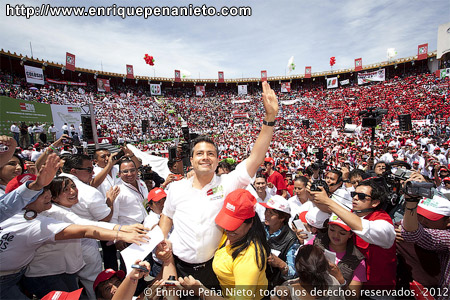
In 2012, even Mexicans having no taste for politics realize which of the candidates got a US blessing. Enrique Peña Nieto from the Institutional Revolutionary Party successfully got through interviews in the White House and the US Congress and managed to convince the US partners of his lasting loyalty and readiness to stick to Calderón's course. Peña dished out guarantees that Mexico would continue to host the operatives from the facilities run by the US intelligence community, DEA, and the army intelligence along with the US corresponding reconnaissance infrastructures, and would not object to the use of US drones in the country's regions where the situation appears «critical». In other words, the plan is that the drug war which is raging in Mexico, with the death toll among ordinary citizens and law enforcement agents already estimated at 60,000, will not lose momentum in the foreseeable future. Peña's neoliberal economic program for the coming six years also resonates with the US Administration. Among other things, Peña promises to lift whatever restrictions currently affecting US companies in Mexico's energy and agricultural sectors.
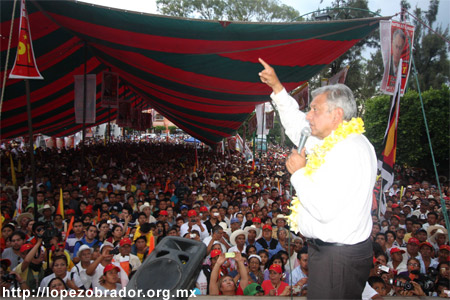
In contrast, Obrador is a left-centrist and nothing like the above is found on his ticket. His credo of a nationally oriented leader includes Mexico's full independence in the spheres of the economy, finances, and defense and the cooperation with the US, which, however important, must proceed on equal terms and be free of the imperial dictate which long proved habit-forming in Washington.
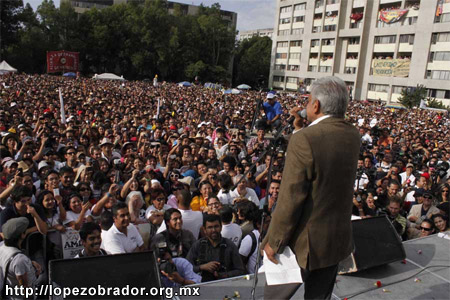
The policy of shadowing the US in foreign policy is known to have eroded Mexico's standing internationally. At the moment, Mexico is perceived across the Western Hemisphere as a minor partner of the US whose mission is limited to rebroadcasting the judgments and assessments authored in Washington. The trend was manifest in Fox's and Calderón's frequent and seemingly unmotivated verbal attacks on the populist regimes of H. Chavez, R. Correa, D. Ortega, E. Morales, and the Castro brothers. As a result, Chavez who has a reputation for never engaging in spats with opponents unless they overstep reasonable limits once publicly referred to Fox as «Bush's poodle».
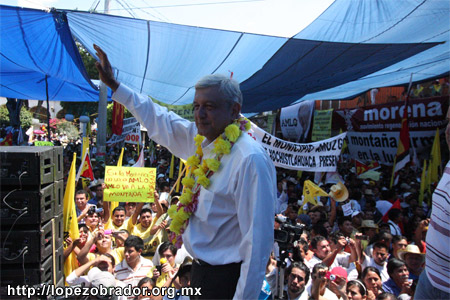
Obrador's echoing Washington in speaking to Latin America is out of question, while it is clear to what extent the role befits Peña. The team assisting the latter understands that few in Mexico favor Washington and does its best to keep the special relationship between their boss and the US embassy under wraps, but the US propaganda support is not something that can be hidden. To dilute the impression, US officials pretend to occasionally court other candidates in Mexico. US vice president J. Biden, for example, met with Josefina Eugenia Vázquez Mota from the currently ruling National Action Party and even with Obrador during his March visit to Mexico. The message pressed by Biden was simple: Washington wants Mexico, under the next president, to carry on with the war on drug cartels. Biden expressed satisfaction in the wake of the tour that the candidates he talked to pledged full continuity of the Mexican anti-drug policy.
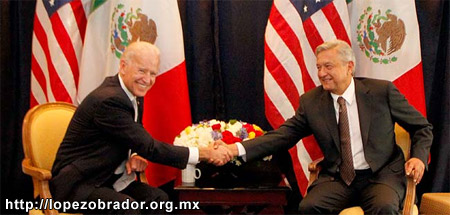
Obrador, it must be noted, offered an alternative perspective on muscling the drug cartels in Mexico. Admitting that Calderón's drawing the army into the process was a step that had to be taken, he does stress that the military came under excessive strain and should be gradually – so as not to leave the population defenseless – sent back to their barracks. Obrador's point is to increasingly charge the police and the special agencies with handling the problem. Obrador plans to nullify all deals with the US which infringed upon the sovereignty of Mexico, including the Merida Initiative which de facto authorized the Pentagon and the CIA to launch operations in the country.
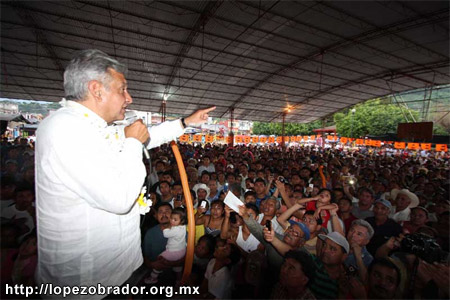
Speaking in Nogales, a city in direct proximity of the US border, Obrador said that, with the due regard for the US, Mexico cannot suffice with interacting with it exclusively in the military sphere, and actually needs development-oriented cooperation. Economic growth and new jobs in Mexico would be more than just a solution to the problem of violence and crime in the country as migration to the US would also go down in a healthier socioeconomic climate. To defuse problems in the US-Mexican relations, Obrador urged the US to extend cheap credit to Mexico instead of sending copters to the country.
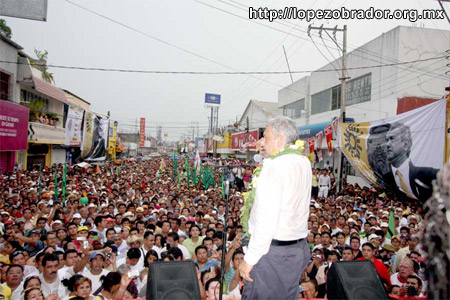
Obrador was forced on a number of occasions to complain about the conduct of his political opponents who tend to steal his campaign slogans. The practice causes him to refrain from completely unveiling his agenda least he inadvertently becomes an adviser to his rivals. The statement did not evade watchers in the US embassy who are guessing what unannounced ideas might surface if he gets into the president's seat and what impact on the US geopolitical interests can be expected in the context. Their worst nightmare is that some sort of a secret link might exist between Obrador and Chavez. Can the US in any way trust the presidential contender whose past victory – even though by the fairly narrow 3-4% margin – was stolen and shamelessly given to Calderón? The US Congress recently held hearings on the contours of the future of Mexico's policy, and the conclusion sounded alarming from Washington's perspective: the US activities which could be freely implemented in Mexico under Calderón would likely be in jeopardy if a candidate less friendly to the US prevails.
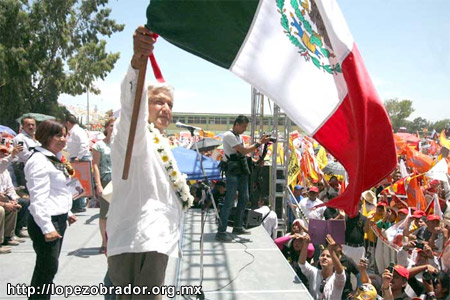
Mexican oligarchic media are as hostile to Obrador now as they used to be in 2006, giving Peña enviable scores which are completely unrelated to reality. Still, Obrador's supporters must be credited with having done a great job locally over the past years to win a greater share of the constituency. A lot of the efforts were channeled via the social media, justly assuming that the young, the students in Mexico – a total of around 14-15 million people – side with Obrador. His rating is climbing steadily, much to the disappointment of Peña. If a plan to «customize» the upcoming elections is on the table somewhere, that would not be easy as this time Obrador's supporters plan to dispatch observers to every polling station in Mexico. Those responsible for the past round of rigging are unmasked, and a new attempt to distort the outcome of the elections would simply cause Mexico to explode.
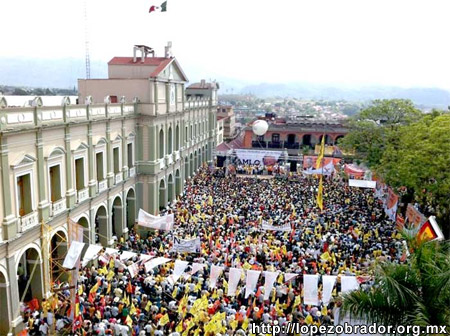
The episode in which a man with a gun approached Obrador sent waves across the social media, and worries are widespread that more of the same is coming. Assassinations of key political figures are part of Mexico's record. Constitutional party candidate Luis Donaldo Colosio Murrieta was killed in 1994 at a rally, and the statement by Obrador, a runner who stands in the way of extremely influential forces, that he has no enemies is not commonly taken at face value. His enemies are in the US Administration and the right-conservative circles in Mexico, not to mention his immediate rivals. The media and bloggers financially backed by various foundations specializing in Internet defamation campaigns are throwing dirt at Obrador, and the Empire's practice of getting rid of opponents by all sort of means – from having them shot dead in local conflicts to passing to them secretly engineered lethal diseases – is an open secret.
A scenario found in Internet is that Obrador will be murdered by a professional killer employed by a drug cartel. That would, by the way, provide the US with an extra argument in favor of intensifying the war on drug groups in Mexico.